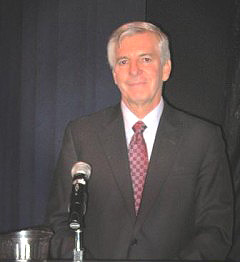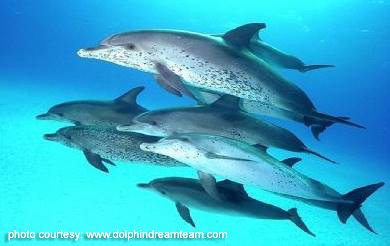A Society that Works
Why dolphin society is more successful than ours.
Dolphins and UsPart One: The Smartest of Us All? “So Long, and Thanks for All the Fish!” Amazing Abilities of Dolphins Dolphins or Humans: Who’s Smarter? Dolphin Society and Culture They’re Super-Brainy, Too More Fascinating Stuff The Great Researcher A Society that Works Are Dolphins “Persons” Life and Culture How Smart is a Dolphin? Experimenting on Dolphins My Visit to the Dolphins Other Links & Videos Mirror Self-Recognition Test The Herman Investigation The Minds of Whales |

Tom White is the Hilton Professor of Business Ethics and Director of the Center for Ethics and Business at Loyola Marymount University. He is the author of Right and Wrong and Discovering Philosophy, as well as In Defense of Dolphins.
You teach business ethics. How did you become fascinated by dolphins?
Tom White: I was working on an introductory textbook on philosophy in 1988 and [visiting] out on the west coast. That was the first time I heard about the tuna dolphin controversy. It was not [yet] a big deal on the East Coast at all. We didn’t know about it. It was a big deal on the West Coast because San Diego was where the American fleet sailed out of. So then I realized there are these big ethical issues connected with it. Then I met Denise Herzing (a scientist who studies dolphins in the wild), and arranged to join a trip on her boat, and I was hooked at that point.
Every summer I was out on Denise’s boat, and the more I got into it, the more fascinating it became – and I decided that instead of doing just one chapter I wanted to do a whole book.
What was so captivating about the dolphins?
T.W.: Seeing them in the wild and being with them in the wild is just so different from dolphins in captivity that you can’t describe it. Dolphins in their own domain – they have a very powerful personality – I mean it’s just different. You cannot have direct experience with dolphins in the wild without really getting this fundamental sense of who they are. You don’t get that at SeaWorld or any other captive facility.
One thing in your book that really jumped out at me was when you start talking about their social consciousness – like it’s a whole different kind of consciousness from our human individual consciousness.
T.W.: One of the things I learned about how scientists see the world of nature and how it operates is that in evolution it’s all about having to adapt to your environment and learn how to survive within that environment.
“Relationships – getting along with one another – are much more important in the ocean than on land. It’s the only way to survive.”
So what becomes most important is the group, your relationship with the group, and managing relationships. And there’s probably a difference in the way the self is defined.
If you ask people “How would you describe yourself to yourself?” you’ll basically get two different answers. If I say, “I’m 6 foot 2, I’m a philosopher, etc.,” you get a definition that’s perfectly appropriate but does not refer to other people. If, on the other hand, I say, “Well, I’m a husband, I’m a teacher, I’m a good friend…,” you can’t be those things without other people.” So you get immediately a social self. Most people will fall in pretty much one direction or the other, so you see this even with humans, this difference that the notion of self can be very social.
 And some scientists suggest that with dolphins the definition of self is dramatically social, which would be logical in order to have the kind of social cohesion that gets people working together. And you realize – which humans don’t seem to realize – that you and your group will do better if you don’t kill one another off. And if you have problems, you find some way to work them out. And one of the best ways of doing that is if you recognize that your welfare depends very much on the welfare of somebody else, and that if you do some kind of harm to somebody else, you are actually doing harm to yourself.
And some scientists suggest that with dolphins the definition of self is dramatically social, which would be logical in order to have the kind of social cohesion that gets people working together. And you realize – which humans don’t seem to realize – that you and your group will do better if you don’t kill one another off. And if you have problems, you find some way to work them out. And one of the best ways of doing that is if you recognize that your welfare depends very much on the welfare of somebody else, and that if you do some kind of harm to somebody else, you are actually doing harm to yourself.
In your book, you ask why, if we humans think we’re so smart, we’re still all killing each other. That’s not very intelligent. Why we’re getting this so screwed up when the dolphins seem to have their act together?
T.W.: Well, whales and dolphins have been around for a much longer time than humans. The [modern] bottlenose has been around for 15 million years, and the modern human has only been around for 100 thousand years maybe. And the common ancestor of whales and dolphins went back to the oceans 50-60 million years ago, but humans [only started to become a separate species] 3-4 million years ago, tops.
And our modern civilization?
T.W.: Five thousand years, maybe? Not a long time. We’re at a very early stage in our learning curve on all of this. I like to think the good news is that we haven’t been around for a long time so we deserve to cut ourselves a little slack. On the other hand, you look at whales and dolphins, and you see big brains, and they don’t overpopulate, they don’t overfish, they seem to have found a way to manage long term survivability of the species, and they don’t go around killing one another. There can be some really rough stuff going on, but it stops before killing and humans don’t do that.
But the jury is still out as to whether or not humans are going to be around over the very long haul. And so the thing that I take is the point about who’s more intelligent here. The most fundamental problem that any species is going to face is surviving. We have these big brains but we can’t even say that we operate in a way that ensures the survivability of the species. We can’t even say that we make the environment more habitable for succeeding generations. In fact we do quite the opposite, which is bizarre when you say you want your kids to have a decent life. You at least give them conditions the same as you, not conditions worse than you.
So there’s the sad but real possibility that we fall into the “too stupid to live” category.
~~~~~~~~~~~~~~~~~~~~~~~~~~~~
You can read an excerpt from Tom White’s book In Defense of Dolphins here. In this excerpt, he explains the difference between being a “human” and being a “person” – i.e. a being with a profound sense of their own identity. And he argues that if we apply certain ethics to the way we treat human persons, we are bound to apply those ethics to how we treat non-human persons.
